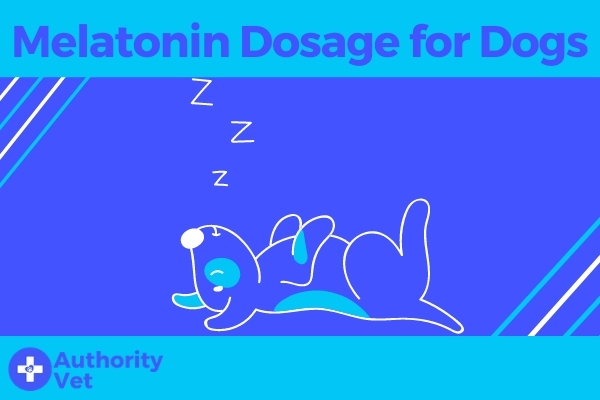You may be wondering if Melatonin will help your dog sleep and if Melatonin is bad for dogs. Melatonin is an all-natural, neurohormone supplement that is produced by the pineal gland.
The pineal gland is located deep within the brain, where the two halves of the brain meet. The pineal gland helps regulate the sleep cycle and signals the body when it’s time to rest and sleep.
Your Veterinarian may recommend an initial lower strength Melatonin to ensure your dog can safely tolerate the supplement before increasing their dose.
While Melatonin is not approved by the FDA for its use in dogs, many Veterinarians will recommend this supplement for off label use due to its sedative and wide range of holistic properties.

Melatonin can be used for a variety of purposes:
Melatonin is used to reduce various forms of phobias, including noise and panic attacks surrounding stressful events. These situations include going to the Vet, long car rides, or when in the presence of fireworks.
While Melatonin is not a true anxiolytic (anxiety treatment), it can help regulate your dogs’ circadian rhythm, improve sleeping habits, and improve their overall mood and behavior associated with anxiousness.
Because Melatonin reduces restlessness, it is an excellent sedation supplement. Your Vet may encourage you to use Melatonin as a sleep aid for your dog if they have a disruptive sleep pattern, such as with Canine Cognitive Dysfunction.
Canine Cognitive Dysfunction (CCD), or dog dementia, is similar to Alzheimer’s in people. CCD causes alterations in your pets’ behavior, changes in activity, confusion, anxiety, disregard for play-time and learned behaviors, irritability, sleep-cycle disturbances, and house-soiling.
It is essential to rule out an underlying condition before starting your dog on Melatonin to ensure you are not masking a severe disease or illness.
*Melatonin has shown promise in treating epilepsy, but this supplement should never be used to replace anticonvulsant prescription medications.

Though Melatonin is generally quite safe to use in dogs, this supplement may cause serious side effects and pose risks to immunocompromised pets if misused.
Melatonin should never be given to dogs without consulting a Veterinarian.
Before starting Melatonin, always read the product label to ensure no toxic ingredients known to dogs such as xylitol, a dangerous artificial sweetener, is in the brand selected.
Pregnant or nursing dogs and puppies should not take Melatonin as side effects have not been exclusively researched in these pets.
Melatonin comes in a variety of forms; tablets, capsules, powder, and liquid. There are even dog-specific Melatonin supplements commercially available for purchase. Melatonin can be given with or without food and will generally take effect 10-15 minutes after administration.
While Melatonin has multiple purposes, it may not be curative in every dog or situation. Consult with your Veterinarian before starting this supplement.
Melatonin helps reduce restlessness and aids with sleep. It is a preferred tranquilizer in place of other prescription medications. A Melatonin dosage calculator will recommend the best estimated dose for your dog based on current veterinary recommendations.
| Dog Weight | Melatonin Strength (daily) |
| 1-9lbs | 1mg |
| 10-24lbs | 1.5mg |
| 25-100lbs | 3mg |
| 100+lbs | 3-6mg |
Your Vet may recommend introducing Melatonin gradually, increasing the dosage as needed.
Melatonin side effects have been thoroughly investigated in dogs and are considered safe to be given at your Vet’s recommendation. Though Melatonin is generally quite safe to use in dogs, this supplement may cause serious side effects and pose risks to immunocompromised pets if given incorrectly. Melatonin should never be provided to dogs without consulting a Veterinarian.
Side effects of Melatonin include:
Melatonin’s effects can last up to eight hours. Therefore, you should not administer this supplement more than three times daily. Many dog owners will give this medication around bedtime to ensure a full nights’ sleep is achieved.
If your dog already suffers from any of the above conditions, you must seek guidance from your Vet before starting Melatonin.
Some prescription medications may interact poorly with Melatonin, and some medical conditions may worsen with the use of this supplement. You should always discuss current medications and supplements with your Vet before giving your dog Melatonin.
Remember, every dog must receive individualized care when it comes to medications and supplements. This is especially true for supplements that can be used to treat various issues such as Melatonin. Drugs that cause drowsiness such as benzodiazepines (Valium, Xanax, and Ativan) should not be used in conjunction with Melatonin.
Seek out the help of your Vet before starting this supplement to ensure that Melatonin is right for your dog.

Nicole is a Licensed and Registered Veterinary Technician in Washington and California. She is the immediate past president of the Washington State Association of Veterinary Technicians and holds multiple advanced degrees in veterinary technology, psychology, and human health care management. She has worked in private and corporate settings. Nicole manages an ambulatory surgery practice based in the Puget Sound area of Washington. When not working in the clinic, Nicole is a frequent lecturer at various national and international conferences and meetings. She is also a tireless advocate for the appropriate use of regenerative therapies in veterinary medicine.
